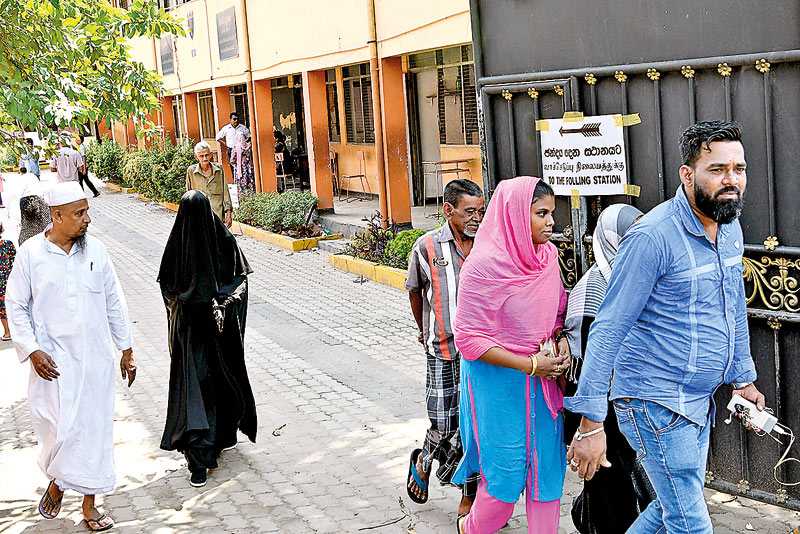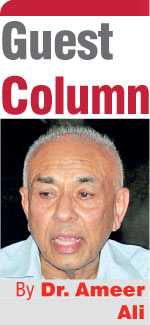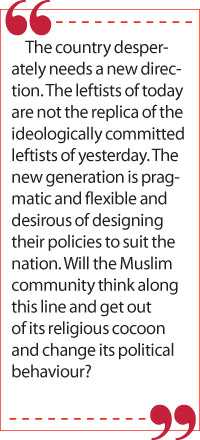Friday Apr 04, 2025
Friday Apr 04, 2025
Thursday, 13 May 2021 00:00 - - {{hitsCtrl.values.hits}}

It is time to think anew and think the unthinkable about Muslim political behaviour. Muslims should fight their political battles not as Muslims but as citizens – Pic by Shehan Gunasekara
 The brazenness of motorists and cyclists to honk and whistle menacingly when they were stopped by security personnel to allow the Chinese Defence Minister’s cavalcade to pass through demonstrated how frustrated and angry the public has become over the regime’s failure not only to control the pandemic but also to deliver its pre-election promises.
The brazenness of motorists and cyclists to honk and whistle menacingly when they were stopped by security personnel to allow the Chinese Defence Minister’s cavalcade to pass through demonstrated how frustrated and angry the public has become over the regime’s failure not only to control the pandemic but also to deliver its pre-election promises.
Never in the history of Sri Lanka has a government elected to power with such a thumping majority as the current one appear to have lost so much in so short a time. Unless NGR decides to turn his de facto military rule de jure, a regime change is unavoidable sooner or later. If such an opportunity arises, how will the Muslim community make use of it?
To say that Muslims are in a state of quandary and helplessness would be an understatement, in the context of successive tragic experiences that shocked the community since 2009.
Although Muslim themselves and their political and religious leadership should also be held responsible to this disappointing turn of events, the ultra-nationalist Sinhala-Buddhist power group that came to dictate political decision making after 2019 proved even more disastrous to an already weakened and tenuous pluralist equilibrium in the country. Muslims became the primary victims of this disequilibrium.
The time has come therefore, to go back to the drawing board and redesign strategies that would at least bring back at least partially the pre-2009 status quo. Past prejudices, beliefs and choices, which may have proved reasonably utilitarian in the past need be reassessed and if found problematic should be discarded.
 Political behaviour of Muslims in Sri Lanka
Political behaviour of Muslims in Sri Lanka
Since 1948, two strains of thought dictated the political behaviour of Muslims in this country. First, was an aversion towards politics of the left, and the second, which is a development from late 1980s, is a belief that only Muslims know what is best for Muslims, and therefore that Muslim parties should be established to fight electoral contests. What was ignored in this thinking was that politics is a secular arena and that religion should be kept out of it.
The aversion towards leftism is ingrained both in the religion of Islam as taught by local mullahs, and in the economic history of Muslims, who arrived as traders and continued to monopolise that profession until recent times.
When Marxist ideology in its varied shapes and practices dominated the thinking and policies of political parties of the left, the sole denominator used by mullahs to dismiss all of them was that they were all atheists and anti-Islam, and therefore to vote for those parties tantamount to vote for Godlessness and betrayal of religious faith. This was why neither the LSSP nor CP in the past ever found much support among Muslims.
For instance, when M.E.H. Muhammad Ali contested the Mutur electorate in 1947 on CP ticket, he lost. Thereafter, he quit CP, contested the same seat in 1952 and won as an Independent candidate. This religiously ingrained aversion was also the reason why Muslims did not support Sirimavo Bandaranaike and her SLFP when she decided to form a coalition with LSSP and CP.
After that, when Badiuddin Mahmud, one of the founders of SLFP, formed the Islamic Socialist Front and called for Muslim support, M.H. Muhammad from the UNP countered with his own Anti-Marxist Front. In spite of all the benefits and privileges enjoyed by Muslims under the coalition regime, they voted the UNP to power in 1977. Badiuddin himself, who performed yeoman service to the community, lost to his UNP rival, when he contested the Batticaloa seat in that election.
A poisonous chalice
Historically, the fact that Muslims are a business community and that trade and commerce, the most representative professions of Islam, became their principal occupation, it drove them to support political parties, which championed the cause of private enterprise and profit motive. They therefore developed a natural tendency to vote for the UNP, and were jubilant when JR won in 1977 and announced his neo-liberal open economy. All this led to a general perception in the public that Muslims are a people who eat biriyani and vote UNP.
The community little realised that an open economy mixed with aggressive doses of ethno-religious nationalism would soon turn out to be a poisonous chalice that would suffocate its entrepreneurial dynamism and commercial advancement. The only leader who foresaw this danger was Badiuddin, whom the community ungratefully shunned.
The idea that only Muslims know what is best for their community and therefore that Muslims should form political parties of their own is the product of post-1979 political Islam, an outgrowth of religious awakening that engulfed Muslim societies everywhere.
In Sri Lanka too, the birth of SLMC and its splinter ACMC should be viewed from that angle. The formation of these two parties was a diabolic error, though perceived by their ideologues as a lasting solution to a particular set of problems that menaced the community at a particular moment of time. Today, that moment has passed but the solution itself has become a problem.
What have these parties achieved and where are they leading the community? Shouldn’t the Muslim party members in Parliament who betrayed the trust placed upon them by their community and decided to vote for the 20th Amendment – apparently with consent of their leaders – to supremely empower a President, who is now on a mission to trample the democratic and human rights of Muslims and those of his opponents, be made answerable? Should Muslims continue to support these individuals and their parties and suffer in silence?
Fight political battles not as Muslims but as citizens
The moment the name Muslim appears in the designation of a political party, Islam enters into it automatically. The same religious prejudices as mentioned earlier would continue to be preached by their leaders. This was quite evident in the history of SLMC since its inception.
The names Allah, Rasool (prophet), Quran and Hadith were dragged on to political platforms to win votes. A secular contest was made sacred and in view of Muslim vox populi, SLMC was deemed as Hizbullah or Allah’s party. Because of this sacrilege, Islam itself became the target of attack and ridicule by non-Muslim opponents. Should those opponents be blamed for this?
It is time to think anew and think the unthinkable about Muslim political behaviour. Muslims should fight their political battles not as Muslims but as citizens. If political parties on the left provide better solutions to problems faced by the country, they should be given a chance to govern and translate their policies into action. Muslims as citizens should support them.
After decades of educational and professional advancement, the Muslim community today has a new generation of young men and women who are intellectually sharp, politically discernible, critical minded and quite alert about events taking place in the country and around the world.
If there is a political party or group that gives priority to economic and social development, relegates religion to the periphery and leave it as private affair, is prepared to consider every citizen equal before law, and guarantees them the same rights and expect from them the same obligations, then that party or group should be given a chance to govern the country.
The country desperately needs a new direction. The leftists of today are not the replica of the ideologically committed leftists of yesterday. The new generation is pragmatic and flexible and desirous of designing their policies to suit the nation. Will the Muslim community think along this line and get out of its religious cocoon and change its political behaviour?
(The writer is attached to the School of Business and Governance, Murdoch University, Western Australia.)
Discover Kapruka, the leading online shopping platform in Sri Lanka, where you can conveniently send Gifts and Flowers to your loved ones for any event including Valentine ’s Day. Explore a wide range of popular Shopping Categories on Kapruka, including Toys, Groceries, Electronics, Birthday Cakes, Fruits, Chocolates, Flower Bouquets, Clothing, Watches, Lingerie, Gift Sets and Jewellery. Also if you’re interested in selling with Kapruka, Partner Central by Kapruka is the best solution to start with. Moreover, through Kapruka Global Shop, you can also enjoy the convenience of purchasing products from renowned platforms like Amazon and eBay and have them delivered to Sri Lanka.
Discover Kapruka, the leading online shopping platform in Sri Lanka, where you can conveniently send Gifts and Flowers to your loved ones for any event including Valentine ’s Day. Explore a wide range of popular Shopping Categories on Kapruka, including Toys, Groceries, Electronics, Birthday Cakes, Fruits, Chocolates, Flower Bouquets, Clothing, Watches, Lingerie, Gift Sets and Jewellery. Also if you’re interested in selling with Kapruka, Partner Central by Kapruka is the best solution to start with. Moreover, through Kapruka Global Shop, you can also enjoy the convenience of purchasing products from renowned platforms like Amazon and eBay and have them delivered to Sri Lanka.